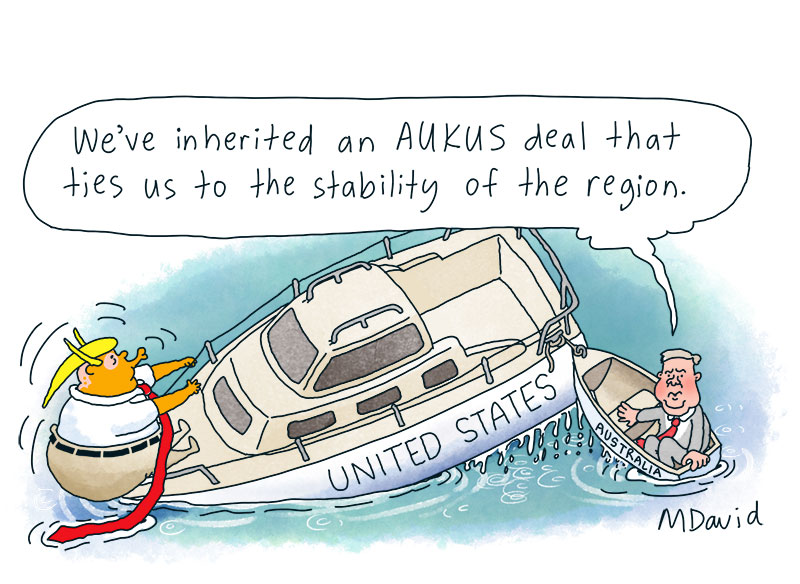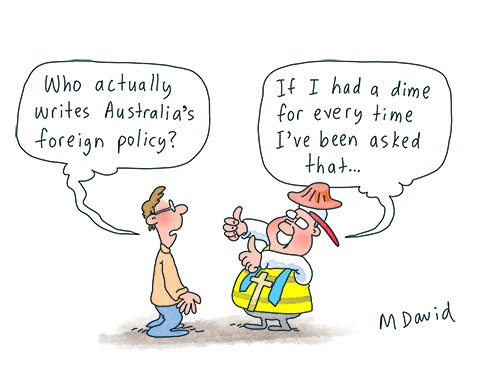Nature's cuckoo displaces its hosts' needs with its own narrow interests. Australia is arguably in thrall to a human cuckoo equivalent — U.S. hegemony, writes Dr Michael Davis.
I HAPPENED upon a poem from a collection of Australian verse, which inspired this story.
I have often heard the mating call of the Channel-billed Cuckoo. However, birdsong is difficult to hear in the troubled background of today — although a prerequisite might be to tune in. The bird and its call are not easily forgotten. Its role in the ecosystem as it migrates into suitable nesting territory is not easily ignored.
Australia hosts this bird – the world’s largest cuckoo – and quite a few of similar ilk. Approximately a dozen cuckoos are found here, killing or starving the young of host species and parasitising the adults. Lurking in plain sight. Yet, they are rarely recognised for their true character.
Cuckoos are not immediately or prominently featured in the Australian idiom as they go about their invasive lives beyond questioning.
Though anchored in time along with their clockwork chime, they form a superficial association, making them immediately more familiar. In this limited sense, their familiarity is quaint and not obviously threatening or ominous. Yet, parasites and bludgers they are!
Cuckoos build no nest. They lay their eggs in the homes of the rest. The host labours to support them to no obvious benefit. The relationship is skewed. The lives of the host young are sacrificed to the parasites — stolen to meet their parasitic needs without challenge.
The hosts silently, unquestioningly pay the price. That this is an enduring, if ignored, relationship concealed in plain sight seems remarkable. Nature offers many such conundrums.
Yet, the cuckoo also provides much by way of metaphor to describe our world. The human cuckoo equivalent leaves a trail of likeminded "cuckoos" in its thrall! Australia is arguably one of these — in thrall to the U.S. hegemon.
‘Beware the cuckoo’ was the warning issued by Ernest G Moll in his 1947 poem of the same name. The name of the cuckoo may have changed over time, but as Moll declared, ‘By what name you call her, she is still the same’.
Such a message seems ignored today. The parasite has displaced the needs of the host population with its own narrow interests. The silence of the hosts and their inability, nay, unwillingness, to question the threat posed by the usurper is at the heart of what has been described as the banality of evil within our own species.
This phenomenon is closer to truth than anyone could imagine. Why does the host display such thoughtlessness — an inability or unwillingness to learn? That is indeed a question that, at some time, we all must face. We have no political leadership to guide us, only apologists for the parasite.
Political deafness arises from a failure to hear sources of concern but, more importantly, to question such sources. This complements blindness and muteness — forming a vacuum of inaction. This vacuum swells when large numbers fail to voice moral convictions due to moral silence, moral blindness, moral muteness and deafness.
Amazingly, not all cuckoos are invaders and parasites, but the exceptions are few and far between. The dominant variants impose themselves. Their hosts endure the consequences.
Former U.S. President Eisenhower coined the term "military-industrial complex". These may be cuckoos of the highest or perhaps of the lowest order.
Once described as "overpaid, oversexed and over here", the representatives of this order are not universally welcomed.
Surely, a parallel exists between the niche filled by the cuckoo and the current U.S. policy of war by proxy? Acknowledging such charges is distasteful — provoking deafness, blindness and perhaps muteness.
But denial is often silent as it is among the hosts to the cuckoo parasite. The antidote must derive from questioning. Since the Second World War, Australia has lost faith in "Mother" and turned head over heels towards "Uncle ANZUS… Quad… AUKUS… Sham"!
Beware the cuckoo. Self-questioning is urgently needed. The problem is in our own nest — its solution is within our grasp.
Beware the cuckoo!
Dr Michael Davis majored in zoology and genetics at Sydney University before entering teaching. He has a Master of Asian Studies and a PhD from Griffith University.
 This work is licensed under a Creative Commons Attribution-NonCommercial-NoDerivs 3.0 Australia License
This work is licensed under a Creative Commons Attribution-NonCommercial-NoDerivs 3.0 Australia License
Support independent journalism Subscribe to IA.












